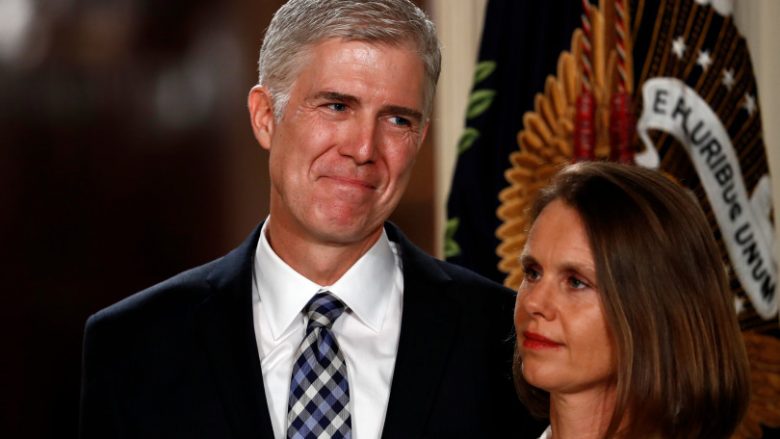Rodeos, Books, and Black Robes: What You Don’t Know About Supreme Court Nominee Neil Gorsuch
By Stephen Beale | February 8, 2017, 7:17 EST
 Judge Neil Gorsuch stands with his wife Louise as President Donald Trump speaks in the East Room of the White House in Washington, Tuesday, Jan. 31, 2017, to announce Gorsuch as his nominee for the Supreme Court.(AP Photo/Carolyn Kaster)
Judge Neil Gorsuch stands with his wife Louise as President Donald Trump speaks in the East Room of the White House in Washington, Tuesday, Jan. 31, 2017, to announce Gorsuch as his nominee for the Supreme Court.(AP Photo/Carolyn Kaster) Judge Neil Gorsuch not only is a brilliant jurist and solid Constitutional originalist who is a worthy successor to Antonin Scalia — but he is also an avid outdoorsman and voracious reader and with a warm personality, one of his former clerks, Michael Kenneally, said in an interview with New Boston Post.
“Right now people are just sort of leafing through his writings,” Kenneally said of President Donald Trump’s nominee to the U.S. Supreme Court. “They don’t have a sense of him as a person.”
Gorsuch, who serves as a judge on the Tenth Circuit Court of Appeals in Denver, Colorado, always went out of his way to make clerks who weren’t from the area feel at home, said Kenneally, who now works at a Washington D.C. law firm.
“He very much likes to have his clerks who come out to Denver — usually who aren’t native Coloradans, but though some are — get a sense of what it’s like to be in Colorado. And so he’s always recommending parks to visit, or ski resorts, or just any kind of attraction. He likes his clerks getting out on the weekend and seeing what Denver has to offer,” Kenneally said.
Gorsuch went on an annual outing with his clerks and their families to the National Western Stock Show in Denver, which includes a rodeo, parade, and shows with horses and livestock. Kenneally recalled showing up to the event with his family. Although one of the main events, a rodeo had already started, he said Gorsuch stepped away and spent nearly half an hour showing his two young children — at that time aged 1 and 3 — around the rest of the show.
“I thought it was just a really nice touch,” Kenneally said, that a “life-appointed, very important person who has decided to spend his time interacting with a 3- and 1-year-old.”
Gorsuch himself is an avid outdoorsman, hiker, and rower. He also enjoys fly fishing — a hobby he shared with Scalia.
In terms of intellect, Gorsuch is “off the charts” smart, Kenneally said.
“He gets very deep into the weeds of the cases that come before him. So he understands the facts and he understands all the precedents and he goes beyond the briefs a lot of time in preparing for oral arguments — that allows him to ask very pointed and insightful questions during oral arguments. And then also in writing opinions he really does a deep dive,” Kenneally said.
Gorsuch is a graduate of Columbia University and Harvard Law School and holds a doctorate in legal philosophy from Oxford. In addition to his duties as a federal judge, he teaches a heavy course load at the University of Colorado Law School, coming close to being a full-time faculty member, according to Kenneally.
On top of that are his many writing projects, speeches, and law review articles. Gorsuch is a co-author of the 942-page treatise The Law of Judicial Precedent and also turned his doctoral dissertation on assisted suicide and euthanasia into a book on the topic.
Gorsuch also manages to find time to read fiction, with Charles Dickens and contemporary novelist David Foster Wallace ranking among his favorites, according to Kenneally.
His wide literary range is well exemplified in a recent speech-turned-article on “Law’s Irony” in which Gorsuch cites Shakespeare, Goethe, and Harper Lee along with Cicero, Demosthenes, and the Federalist Papers.
He also shares with Scalia a commitment to writing opinions that are not only legally acceptable but also engaging, according to Kenneally. In one dissent quoted by the American Bar Association Journal, he waxes poetic in describing what otherwise might seem like a dry insurance case:
Haunted houses may be full of ghosts, goblins, and guillotines, but it’s their more prosaic features that pose the real danger. Tyler Hodges found that out when an evening shift working the ticket booth ended with him plummeting down an elevator shaft.
In a concurring opinion in the 2016 case Cordova v. Albuquerque, Gorsuch penned a memorable critique against loose interpretations of the Constitution that depart from its original understanding:
“Respectfully, I would decline the parties’ invitation to their fight. We are not in the business of expounding a common law of torts. Ours is the job of interpreting the Constitution. And that document isn’t some inkblot on which litigants may project their hopes and dreams for a new and perfected tort law, but a carefully drafted text judges are charged with applying according to its original public meaning. If a party wishes to claim a constitutional right, it is incumbent on him to tell us where it lies, not to assume or stipulate with the other side that it must be in there someplace.”
While many have focused on the similarities between Gorsuch and Scalia, there are also notable differences, according to Kenneally, who also clerked for Scalia in his final year on the court. He described Scalia as “larger than life, boisterous figure” while Gorsuch is a “bit more reserved.”
Gorsuch’s humility — along with his self-deprecating humor — extends to his view of his profession as he explained in his speech, “Law’s Irony”:
“As my daughters remind me, donning a robe doesn’t make me any smarter. But the robe does mean something — and not just that I can hide coffee stains on my shirt. It serves as a reminder of what’s expected of us — what Burke called the “cold neutrality of an impartial judge.” It serves, too, as a reminder of the relatively modest station we’re meant to occupy in a democratic society. In other places, judges wear scarlet and ermine. Here, we’re told to buy our own plain black robes — and I can attest the standard choir outfit at the local uniform supply store is a good deal. Ours is a judiciary of honest black polyester.”
“He’s very much a ‘what you see is what you get’ guy,” Kenneally said.
Stephen Beale can be reached at [email protected]. Follow him on Twitter @bealenews.









